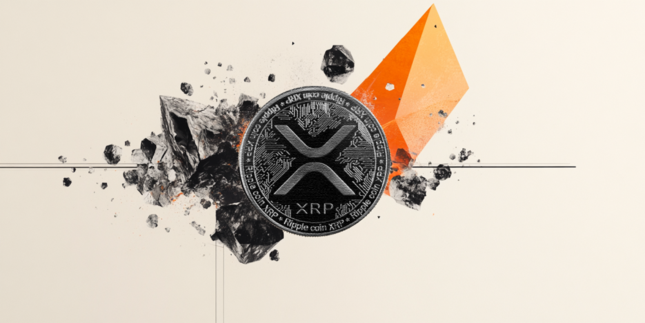ETHEREUM NEWS, ANALYSIS AND FORECAST
Latest Ethereum News
Ethereum Technical overview
Latest Ethereum Analysis
Editors' picks

Ripple slides as low retail, institutional demand weigh
Ripple edges lower, trading marginally below $1.60 at the time of writing on Tuesday as bulls and bears battle for control. The cross-border remittance token rose to $1.66 on Monday, but profit-taking and risk-off sentiment in the broader crypto market led to the ongoing correction.

Monero Price Forecast: XMR extends decline amid persistent bearish outlook
Monero remains under intense selling pressure for the third consecutive week, recording a 4% loss at press time on Tuesday. This is consistent with the declining retail interest in privacy coins, which was among the lowest-performing segments over the last week.

Bitcoin recovers slightly amid ETF inflows, Strategy accumulation
Bitcoin price steadies at $78,000 on Tuesday after rising 2.30% the previous day, following last week’s massive correction. US-listed spot ETFs record an inflow of $561.89 million on Monday, while Strategy adds 855 BTC to its reserve.

Crypto Today: Bitcoin, Ethereum, XRP recovery stalls amid mixed ETF flows
Bitcoin holds above $78,000 but struggles to extend its recovery amid ETF inflows. Ethereum trades under pressure below the $2,300 immediate hurdle, undermined by weakening technical structure.

Crypto Today: Bitcoin, Ethereum, XRP tilt toward breakout on risk-on sentiment
Bitcoin (BTC) kicked off October on a strong note, with the price breaking above $116,000 on Wednesday. Despite a market-wide expectation that September is usually a bearish month for cryptocurrencies, BTC posted gains of 5.31%.
BTC
ETH
XRP
What is Ethereum?
Ethereum is the first decentralized open-source blockchain network with smart contract functionality.
Smart contracts are publicly verifiable codes that automate agreements between two or more parties. They self-execute encoded actions when predetermined conditions are met. These smart contracts that run on the Ethereum virtual machine (EVM) allow developers to build decentralized applications that cut across finance (DeFi), gaming (GameFi), governance (DAOs), asset management, non-fungible tokens (NFTs), supply chain, customer loyalty programs, etc.
Originally conceived by Vitalik Buterin and co-founded alongside Gavin Wood, Joseph Lubin, Charles Hoskinson and others, Ethereum is also home to millions of cryptocurrencies and non-fungible tokens.
Most activities within the Ethereum ecosystem are powered by its native token, Ether (ETH), the second-largest cryptocurrency and number one altcoin by market capitalization. Ether is used for global payments, liquidity provision, and gas fee settlement.
Gas refers to the fees users pay to compensate the network for computational efforts expended in processing transactions or executing smart contracts. Gwei, which is one billionth of an Ether, is the unit for measuring gas on the Ethereum network. During periods of network congestion, gas can be extremely high, causing validators to prioritize transactions based on their fees.
What is staking?
Staking is the process of validating transactions on Ethereum and earning yield on your idle crypto assets. It involves locking your Ether tokens in a crypto protocol for a specified duration to contribute to Ethereum's security.
Ethereum transitioned from a Proof-of-Work (PoW) to a Proof-of-Stake (PoS) consensus mechanism on September 15, 2022, in an event christened "The Merge." The Merge was a key part of Ethereum's roadmap to achieve high-level scalability, decentralization and security while remaining environmentally sustainable.
Unlike PoW, which requires the use of energy-intensive hardware that may cause high carbon emissions, PoS reduces the barrier of entry for validators by leveraging the use of crypto tokens as the core foundation of its consensus process.
Best cryptocurrency exchanges to buy Ethereum
There are several factors to consider before choosing an exchange to buy cryptocurrencies. With hundreds of exchanges available, selecting one that aligns with your trading or investing preferences is important.
Crypto exchanges are divided into two major categories – centralized and decentralized exchanges.
Centralized crypto exchanges are platforms that operate under the supervision of a third party. This means that a central authority oversees the actions of every user on the exchange.
Decentralized exchanges operate without the involvement of third-party intermediaries. These exchanges use smart contracts known as automated market makers (AMMs) to manage trades between users.
However, before exploring the product suites of a crypto exchange, investors should ensure that it legally operates within their locality. It's not advisable to trade on unregulated exchanges due to the associated risks. In certain countries, trading on an unregulated exchange could attract a penalty for the user. In the United States, the body that regulates exchanges is the Securities & Exchange Commission (SEC).
Another factor to consider when choosing an exchange is its interface. Typically, newer investors are advised to select exchanges with simple features for easy navigation. Most popular exchanges often offer simpler services to new users to avoid unnecessary complexities while using the platform.
Investors may also consider factors such as an exchange's asset range, deposit/withdrawal options, on/off ramp solutions and security measures.
Furthermore, it's advisable to consult prominent review websites before choosing an exchange, as poor reviews are a potential red flag. FXStreet offers reviews for several exchanges where you can trade cryptocurrencies, stocks, commodities and fiat currencies.
Ethereum vs Bitcoin
- Bitcoin has a supply cap of 21 million BTC that will eventually be achieved sometime in 2140, while Ether has no supply limits.
- Ether often follows a deflationary trend through a burn mechanism that keeps its supply static or reduced. Bitcoin, on the other hand, aims to maintain a deflationary path through its supply cap and halving mechanism.
- Ethereum leverages a Proof-of-Stake consensus mechanism and Layer 2 networks to boost its scalability and ensure transaction fee reduction. Conversely, Bitcoin uses a slower consensus model known as Proof-of-Work, often criticized for its high energy consumption.
- Ethereum is a programmable blockchain that can host decentralized applications (dapps) and other tokens, including cryptocurrencies and non-fungible tokens (NFTs). Bitcoin only allows for decentralized peer-to-peer transactions and can't host dapps or other crypto tokens.
- The programming language of Bitcoin is C++, while that of Ethereum is Solidity.
- Bitcoin can be subdivided into eight decimals, while Ether is divisible into eighteen decimal places.